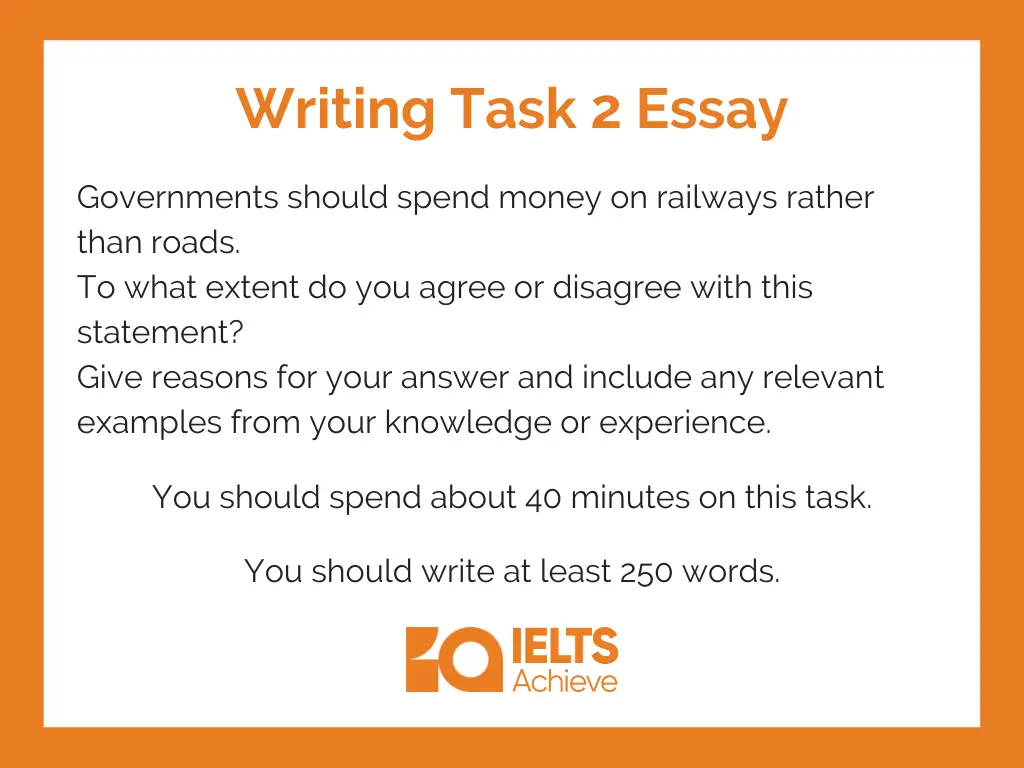
Governments should spend money on railways rather than roads.
To what extent do you agree or disagree with this statement?
Give reasons for your answer and include any relevant examples from your knowledge or experience.
Write at least 250 words.
Explore more Positive/Negative Questions with Answers
Essay:
The allocation of public funds is a contentious issue that elicits varied opinions, especially when it comes to investing in transportation infrastructure. While some advocate for increased expenditure on railways, others believe that roads warrant more attention. This essay will argue that a balanced approach is required, where both railways and roads receive adequate funding based on specific regional requirements.
One compelling argument for allocating more funds to railways is their potential for substantial environmental benefits. Trains, particularly electric ones, are far more energy-efficient and generate less carbon emissions per passenger or tonne of freight than most motor vehicles. In addition, railways can contribute to reducing traffic congestion in cities, which not only improves air quality but also mitigates the economic cost of time wasted in traffic.
However, concentrating funding solely on railways while neglecting roads is short-sighted. Roads are essential for the transportation of goods and people in areas where railway infrastructure is lacking or nonexistent. This is particularly true in rural or remote regions, where roads are often the only viable form of transport. Moreover, roads are fundamental for emergency services and local commuting, aspects that are frequently not covered by railways.
As an example, in my home country, a balanced approach has proven successful. We have modern, efficient railways for intercity transport and goods movement, but also well-maintained roads that cater to local transportation and remote areas. This strategy effectively addresses the unique needs of different regions.
In conclusion, while railways offer substantial environmental and economic benefits, it would be unwise to neglect the crucial role that roads play in transportation, particularly in remote areas. Therefore, I disagree with the assertion that government funding should be skewed towards railways; instead, a balanced, context-specific allocation is needed to cater to the diverse transport needs of a country.
Explore more IELTS Writing Task 2 Questions with Answer
Vocabulary List:
Contentious (adjective): Causing or likely to cause disagreement or controversy.
Immigration is a contentious issue in many countries.
Elicit (verb): To draw out or bring forth.
The teacher’s question elicited a range of responses from the students.
Advocate (verb): To publicly recommend or support.
Many environmentalists advocate for renewable energy sources.
Mitigate (verb): To make less severe, serious, or painful.
Effective planning can mitigate the risks associated with business expansion.
Short-sighted (adjective): Lacking imagination or foresight.
Making quick profits by exploiting natural resources is a short-sighted approach.
Nonexistent (adjective): Not existing or not real or present.
In some remote areas, healthcare facilities are virtually nonexistent.
Skew (verb): To distort by placing too much emphasis on one aspect of something.
The media often skews public perception by focusing on negative stories.
IELTS Writing Task 2 Question Types
Agree/Disagree Essays
ADVANTAGE / DISADVANTAGE ESSAY
CAUSE AND EFFECT ESSAY
IELTS Problem/Solution Essay
IELTS Discussion Essay
POSITIVE OR NEGATIVE ESSAY
Direct Question Essay
IELTS Writing Task 2 Student Essay

